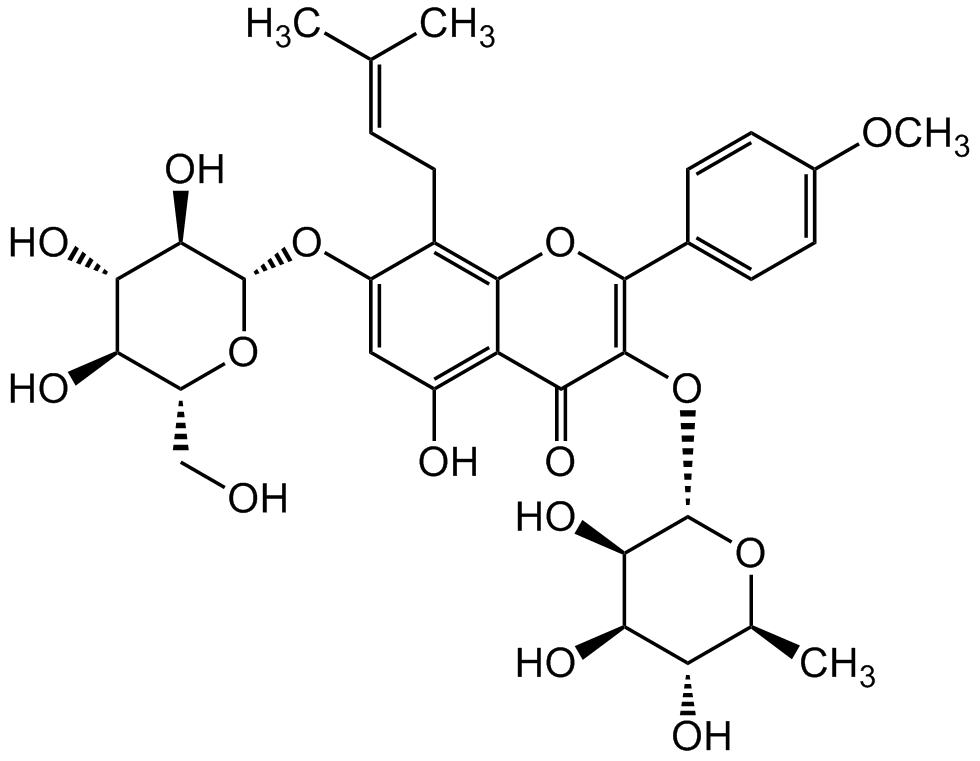
Chemical Structure
Icariin [489-32-7] [489-32-7]
CDX-I0172
CAS Number489-32-7
Product group Chemicals
Estimated Purity>97%
Molecular Weight676.668
Overview
- SupplierChemodex
- Product NameIcariin [489-32-7] [489-32-7]
- Delivery Days Customer2
- CAS Number489-32-7
- CertificationResearch Use Only
- Estimated Purity>97%
- Molecular FormulaC33H40O15
- Molecular Weight676.668
- Scientific DescriptionChemical. CAS: 489-32-7. Formula: C33H40O15. MW: 676.668. Icariin, the active component of the Chinese medicinal plant E. brevicornum. It has been shown to have anti-inflammatory, anticancer, antioxidant, osteoprotective, neuroprotective and cardioprotective activity. It has been shown to enhance bone formation and bone regeneration. Icariin may be beneficial to Alzheimers disease by reducing the production of extracellular amyloid plaques and intracellular neurofibrillary tangles and inhibiting phosphodiesterase-5 activity. The anti-cancer activity is related to various mechanisms such as apoptosis and autophagy induction, cell cycle modulation, antiangiogenesis and antimetastasis, modulating multidrug resistance and immunomodulation. Icariin interacts with several pathways, like PDE, TGF-beta, MAPK, PPAR, NOS, IGF, Sirtuin and others. Icariin has been shown to inhibit the NF-kappa activation pathway and NLRP3 inflammasome. - Icariin, the active component of the Chinese medicinal plant E. brevicornum. It has been shown to have anti-inflammatory, anticancer, antioxidant, osteoprotective, neuroprotective and cardioprotective activity. It has been shown to enhance bone formation and bone regeneration. Icariin may be beneficial to Alzheimers disease by reducing the production of extracellular amyloid plaques and intracellular neurofibrillary tangles and inhibiting phosphodiesterase-5 activity. The anti-cancer activity is related to various mechanisms such as apoptosis and autophagy induction, cell cycle modulation, antiangiogenesis and antimetastasis, modulating multidrug resistance and immunomodulation. Icariin interacts with several pathways, like PDE, TGF-beta, MAPK, PPAR, NOS, IGF, Sirtuin and others. Icariin has been shown to inhibit the NF-kappa activation pathway and NLRP3 inflammasome.
- SMILESO=C1C2=C(O)C=C(O[C@H]3[C@H](O)[C@@H](O)[C@H](O)[C@@H](CO)O3)C(C/C=C(C)/C)=C2OC(C4=CC=C(OC)C=C4)=C1O[C@H]5[C@H](O)[C@H](O)[C@@H](O)[C@H](C)O5
- Storage Instruction-20°C,RT
- UNSPSC12352200

![Icariin [489-32-7]](https://bpsbioscience.com/media/catalog/product/2/7/27217_structure.png)


![Icariin [489-32-7]](https://www.targetmol.com/group3/M00/36/CB/CgoaEGayQ7OEEFYcAAAAAAQy3eA482.png)